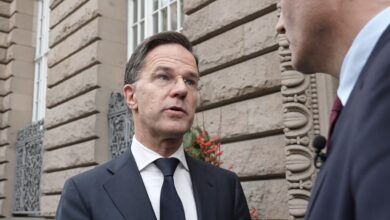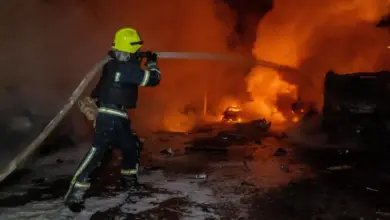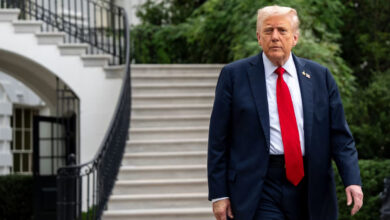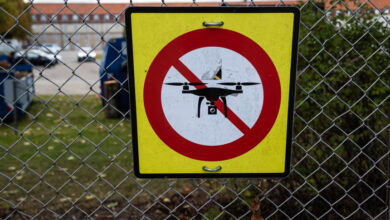KANDAHAR, Afghanistan – A weeping Afghan President Hamid Karzai led thousands of mourners on Wednesday at the funeral of his brother, whose assassination could push southern Afghanistan into renewed instability.
Ahmed Wali Karzai may have been dogged by allegations of links to the drugs trade and corruption, but his shock killing at home by his own head of security deprives NATO and the government of their main ally in the volatile south.
Analysts have warned that his death creates a dangerous power vacuum in Kandahar, the birthplace of the Taliban militia, where rivals are expected to jockey for influence as the US-led NATO mission starts to withdraw troops.
Underlining fears of increased insecurity, two bombs were found along the path of the funeral cortege from Kandahar city to Dand district, where the younger Karzai was buried in the family plot.
NATO troops detonated both devices in controlled explosions, police said.
The governor of neighboring Helmand province, another bitter battleground against the Taliban, escaped unhurt with his provincial intelligence chief when a bomb attack targeted their convoy en route to the funeral.
Prayers were held at the Mandigak Palace, a government guesthouse, before the body was driven 30 minutes for burial in the family village of Karz, followed by the president's delegation that included turbaned tribesmen.
The Afghan leader cried openly during the burial, at one point climbing inside the grave to help move his brother's body and kissing his forehead as the corpse was lowered into the ground.
Two trees symbolizing patience and strength were planted next to the family plot, where Karzai's ancestors have also been laid to rest.
The president later left the graveyard in tears, helped into his armoured car by former Kandahar governor Gul Agha Sherzai and other officials.
Security – already tight in violent Kandahar province – was stepped up significantly for the funeral with police and soldiers deployed en masse, with the main thoroughfares closed to traffic and largely free of pedestrians.
The venue where Wali Karzai's body was held overnight was taken over by President Karzai's personal security force, as well as Afghan and US troops who guarded the area with light and heavy weapons, an AFP reporter said.
US Secretary of State Hillary Clinton telephoned the Afghan president to offer her condolences and said Washington remained "committed to supporting the government and people of Afghanistan in their struggle for peace".
Speculation has continued to mount about the motive behind the killing of the younger Karzai, who was 49 and the president's half-brother, by a seemingly trusted aide.
The Taliban claimed to have recruited the gunman, but there was doubt after the regional police chief and other officials identified the assassin as the long-serving chief of his family's personal protection force.
Kandahar police chief Abdul Razeq named him as Sardar Mohammed, commander of 200 bodyguards who had provided security for the Wali Karzai's family in the city for seven years. He was killed immediately afterwards.
"An investigation is under way to determine if it was a personal hostility or there were some foreign hands behind it," Kandahar governor Tooryalai Wesa told reporters.
"He was a very trusted person. He (Wali Karzai) knew him for years. No one could even think he would do such a thing."
Analysts and security experts said there was no shortage of possible candidates wishing to get rid of the powerful Wali Karzai, who was the provincial council chief.
But one Western security official said it was unlikely to have been a Taliban hit.
"Wali Karzai was the real leader of the city (Kandahar), in fact he ruled a fiefdom and his involvement in drug trafficking is proven. I doubt the involvement of the Taliban in his murder," said the official.
The killing raises disturbing questions about infiltration among those closest to the Karzai family.
The timing of the assassination could not be worse for the US-led NATO force as it starts withdrawing troops, handing over to Afghan forces as the leaders of Western states search for a political solution after a decade of war.
Kandahar is a make-or-break battleground in the US-led fight to defeat the insurgency, where Washington has poured in thousands of extra troops to wrest the initiative from the Taliban and bolster the Afghan government.
In April, the provincial police chief was killed in a suicide bombing by one of his own bodyguards, who was believed to have known him for 10 years.




